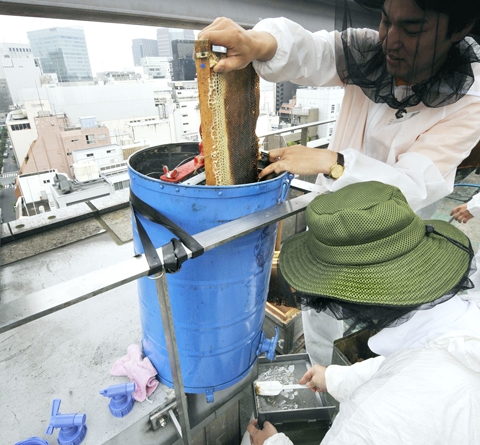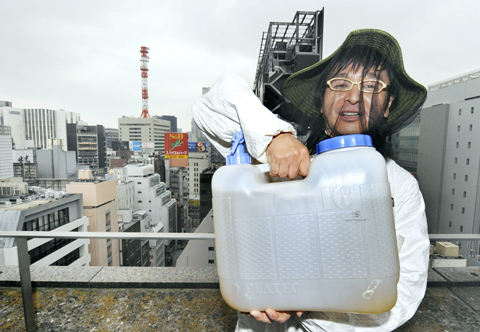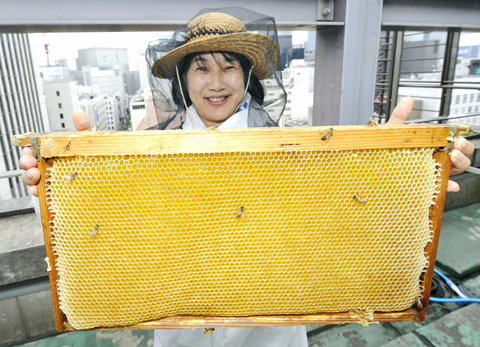Tokyo’s Ginza district is usually abuzz with shoppers and office workers, but high above its skyscrapers nature-lovers have created a home for real busy bees — the ones that make honey.
It’s part of a project to bring a slice of natural life back to the center of the world’s largest urban sprawl, a cityscape home to more than 30 million people that stretches far beyond the horizon.
Eleven stories above the heart of the Tokyo concrete jungle — with its beehive office partitions and swarms of suit-clad worker-bees — enthusiasts have stacked up beehives dripping with golden honey.

PHOTO: AFP
“Let’s enjoy the harvest, but be careful you don’t have an accident,” urban beekeeper-in-chief Kazuo Takayasu tells his fellow volunteers from behind the protective fine-mesh net covering his face.
Clad in white body suits, the crew gets to work, squeezing out the glistening syrup using a simple centrifugal machine they crank by hand as a cloud of bees breaks free from the honeycombs.
“Don’t be scared. They don’t sting unless you harm them,” says Satoshi Nagai, 49, who has taken a break from his desk at Mitsubishi UFJ Morgan Stanley Securities. “Try the honey. The scent has a touch of citrus.”

PHOTO: AFP
The honey is largely organic, he said, because pesticide use has been banned in Tokyo city parks and gardens including the Imperial Palace, about 1.5km away, where the bees collect much of their nectar.
“Through beekeeping, you get to learn how harmful pesticides are for insects,” he said. “It makes you think about your hobby of playing golf on courses which cannot be maintained without pesticides.”
The beekeepers may be an odd sight in the Japanese capital, but they are not the only urban farmers — on a rooftop just blocks away, barefoot farmers were recently wading through almost knee-high mud to plant a wet rice field.

PHOTO: AFP
On top of the building of the Hakutsuru Sake Brewing Co, its employees and their spouses and children are screaming with excitement as they stomp barefoot, the mud squelching between their toes.
“Good job, good job! Well done!” says Asami Oda, 56, the vice president of Hakutsuru’s Tokyo office, who takes care of the rice paddies every day. “We harvest 60kg of rice every year, from which we make 80L of sake. Of course it’s organic. I like having a pesticides-free harvest, which is also good for the honey bees,” he says.
Projects such as these have gained attention here this year as Japan readies to host a 193-nation international conference on biodiversity, which aims to find ways to stem the world’s massive species loss.
The 10th meeting of the Convention on Biological Diversity will be held in the central city of Nagoya in October to discuss a pressing environmental issue that has received less attention in recent years than climate change.
Animal and plant species are disappearing around the world at the fastest rate known in geological history and most of these extinctions are tied to human activity, the UN Environment Programme says.
Species under threat include 21 percent of all known mammals, 30 percent of known amphibians and 12 percent of known birds, according to the International Union for Conservation of Nature.
The Earth is now losing a species about once every 20 minutes, the non-profit group Conservation International estimates.
Scientists warn that wildlife habitat destruction is destroying ecosystems that give humans “environmental services” such as clean water and air and are vital for climate control and food production.
Honeybees are a case in point in Japan.
The price of honeybees has doubled in recent years after imports were banned to prevent the spread of parasites and as local populations declined in a phenomenon that beekeepers have blamed on pesticide use.
Because of the shortage of bees that help pollination, farmers have reported that fruits don’t grow well enough to satisfy urban consumers.
“We’ve received a number of complaints from beekeepers that pesticides kill honeybees,” Kazuo Kimura of the Japan Beekeepers Association says.
Japanese scientists taking part in the biodiversity meeting have discussed ways to convince Japan’s highly urbanized public how important biodiversity is.
“Urban beekeeping and rice growing are good examples of how human beings can reshape their relationship with nature,” says Kazuhiko Takeuchi, director of the Institute for Sustainability and Peace at the UN University in Tokyo. “Above all, it’s effective in changing people’s mindsets.”

DEFENDING DEMOCRACY: Taiwan shares the same values as those that fought in WWII, and nations must unite to halt the expansion of a new authoritarian bloc, Lai said The government yesterday held a commemoration ceremony for Victory in Europe (V-E) Day, joining the rest of the world for the first time to mark the anniversary of the end of World War II in Europe. Taiwan honoring V-E Day signifies “our growing connections with the international community,” President William Lai (賴清德) said at a reception in Taipei on the 80th anniversary of V-E Day. One of the major lessons of World War II is that “authoritarianism and aggression lead only to slaughter, tragedy and greater inequality,” Lai said. Even more importantly, the war also taught people that “those who cherish peace cannot

STEADFAST FRIEND: The bills encourage increased Taiwan-US engagement and address China’s distortion of UN Resolution 2758 to isolate Taiwan internationally The Presidential Office yesterday thanked the US House of Representatives for unanimously passing two Taiwan-related bills highlighting its solid support for Taiwan’s democracy and global participation, and for deepening bilateral relations. One of the bills, the Taiwan Assurance Implementation Act, requires the US Department of State to periodically review its guidelines for engagement with Taiwan, and report to the US Congress on the guidelines and plans to lift self-imposed limitations on US-Taiwan engagement. The other bill is the Taiwan International Solidarity Act, which clarifies that UN Resolution 2758 does not address the issue of the representation of Taiwan or its people in

Taiwanese Olympic badminton men’s doubles gold medalist Wang Chi-lin (王齊麟) and his new partner, Chiu Hsiang-chieh (邱相榤), clinched the men’s doubles title at the Yonex Taipei Open yesterday, becoming the second Taiwanese team to win a title in the tournament. Ranked 19th in the world, the Taiwanese duo defeated Kang Min-hyuk and Ki Dong-ju of South Korea 21-18, 21-15 in a pulsating 43-minute final to clinch their first doubles title after teaming up last year. Wang, the men’s doubles gold medalist at the 2020 and 2024 Olympics, partnered with Chiu in August last year after the retirement of his teammate Lee Yang

The Philippines yesterday criticized a “high-risk” maneuver by a Chinese vessel near the disputed Scarborough Shoal (Huangyan Island, 黃岩島) in a rare incident involving warships from the two navies. The Scarborough Shoal — a triangular chain of reefs and rocks in the contested South China Sea — has been a flash point between the countries since China seized it from the Philippines in 2012. Taiwan also claims the shoal. Monday’s encounter took place approximately 11.8 nautical miles (22km) southeast” of the Scarborough Shoal, the Philippine military said, during ongoing US-Philippine military exercises that Beijing has criticized as destabilizing. “The Chinese frigate BN 554 was